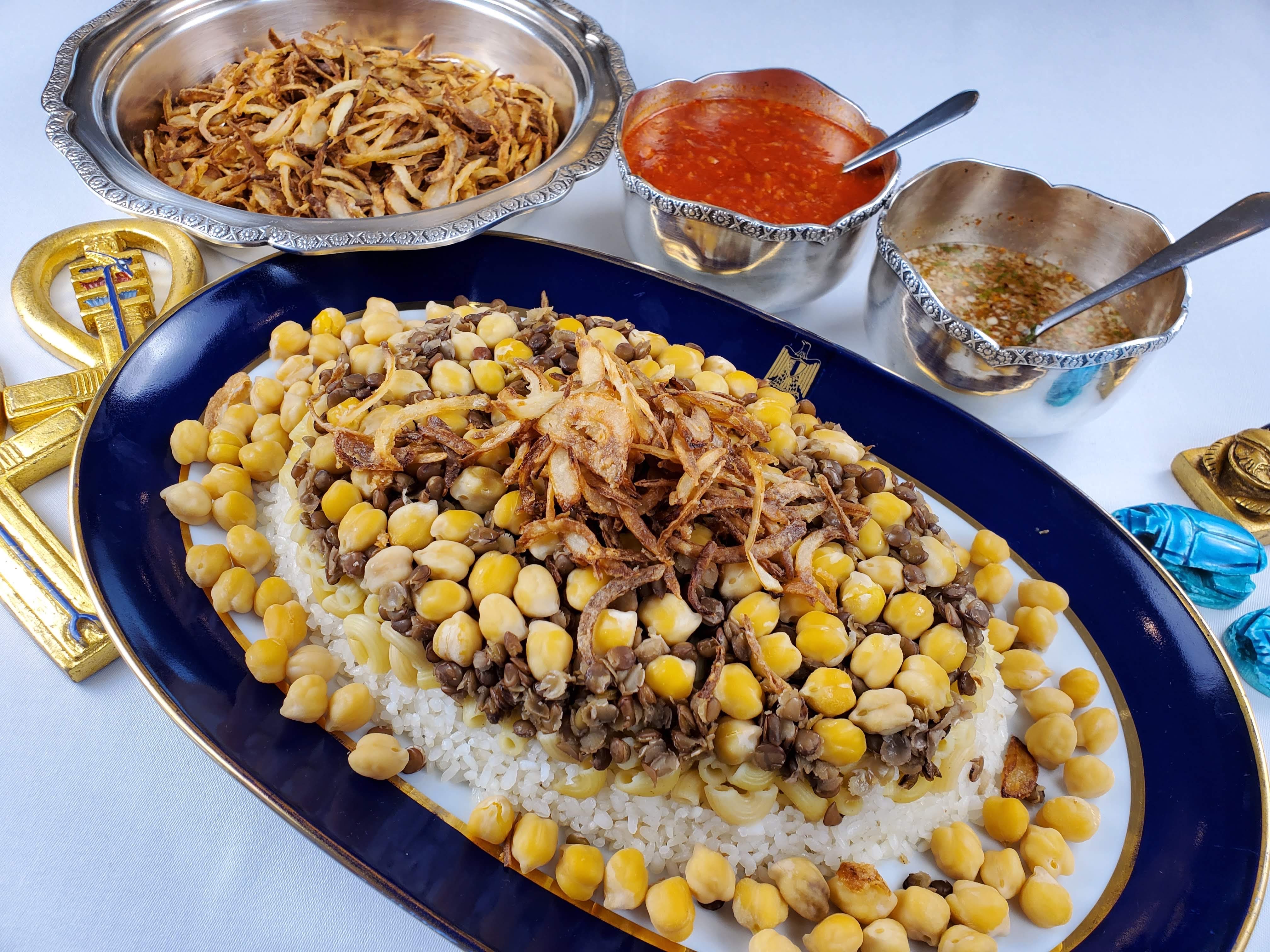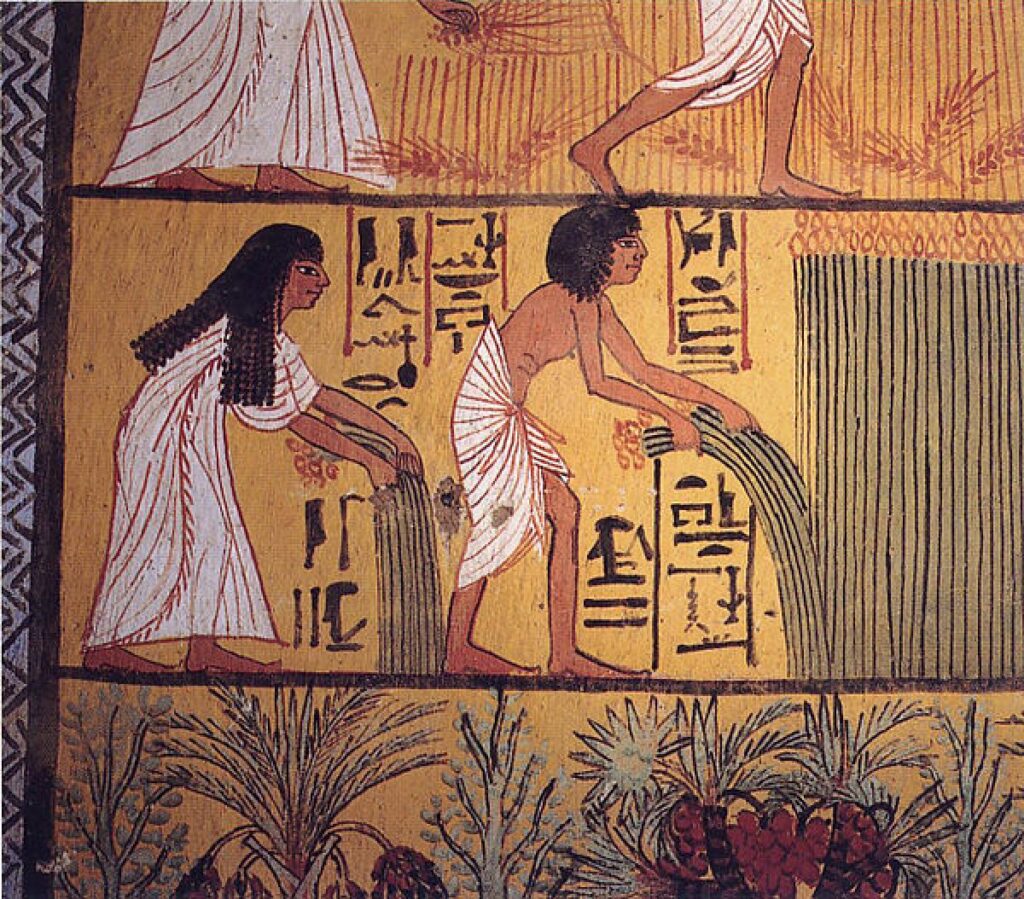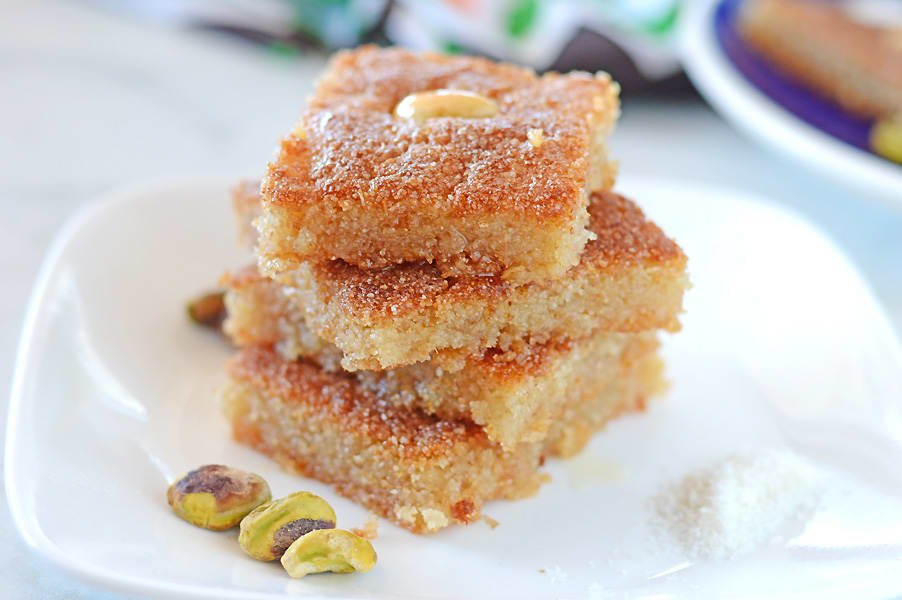Bite of the Nile: Unveiling Egypt's Culinary Treasures

Egypt is a land of rich history, stunning landscapes, and a vibrant culture. But one aspect of Egypt that often gets overlooked is its incredible cuisine. From hearty stews to aromatic spices, Egyptian food is a true feast for the senses. In this blog post, we will take you on a delicious journey through the culinary delights of Egypt.
Discovering the culinary delights of Egypt
One of the first things you'll notice about Egyptian food is its incredible diversity. From street food stalls to fine dining restaurants, there's something for every palate. Here are just a few dishes that you absolutely must try:
-
Koshary: This popular street food is a delicious mix of rice, lentils, macaroni, and chickpeas, topped with a tangy tomato sauce and fried onions.
-
Ful medames: This traditional Egyptian breakfast dish consists of slow-cooked fava beans seasoned with garlic, lemon juice, and olive oil. It is often served with warm pita bread.
-
Mulukhiyah: This hearty soup is made from jute leaves and is often served with chicken or rabbit meat. It is traditionally eaten with rice or bread.
-
Mahshi: This dish is made by stuffing vegetables such as bell peppers, zucchinis, and grape leaves with a delicious mixture of rice, herbs, and spices. It is then cooked in a flavorful tomato sauce.
The historical significance of Egyptian cuisine
Egyptian cuisine is not only delicious but also holds a significant place in history. Many of the dishes and ingredients can be traced back thousands of years, showcasing the culinary traditions that have been passed down through generations. Here are a few examples:
-
Date palms: Dates were an essential part of the ancient Egyptian diet and are still widely consumed today. They were used for both sweet and savoury dishes and were often given as offerings to the gods.
-
Honey: Egyptian honey was highly prized and was used to sweeten many dishes. It was also used for medicinal purposes and was believed to have healing properties.
-
Spices: Ancient Egyptians were known for their love of spices. They used a variety of spices, such as cumin, coriander, and cinnamon, to enhance the flavours of their dishes.
Egyptian cuisine is a wonderful blend of delicious flavours, rich history, and cultural significance. Whether you're exploring the bustling streets of Cairo or enjoying a meal with locals in a small village, be sure to indulge in the culinary delights that Egypt has to offer.

Traditional Egyptian Dishes
Koshari: The ultimate comfort food
Koshari is a must-try dish when visiting Egypt. It is a popular street food that combines rice, lentils, macaroni, and chickpeas in a delightful medley of flavours. Topped with a tangy tomato sauce and crunchy fried onions, Koshari offers a satisfyingly hearty and comforting experience.
Ful Medames: A staple of Egyptian breakfast
When it comes to breakfast in Egypt, Ful Medames is a classic dish that cannot be missed. Made from slow-cooked fava beans, flavoured with garlic, lemon juice, and olive oil, this dish is rich in taste and nutrients. It is often served with warm pita bread, allowing you to savour every bite while enjoying the traditional Egyptian breakfast experience.

Street Food Wonders
Taameya: Egypt's own version of falafel
When it comes to street food in Egypt, Taameya is a must-try delicacy. Similar to falafel, this vegetarian dish is made from crushed fava beans, mixed with herbs and spices, and then deep-fried to perfection. The result is a crispy and flavorful bite that is typically served with warm pita bread and a side of tahini sauce. Whether you’re looking for a quick snack or a satisfying meal, Taameya is a delicious choice that will leave your taste buds wanting more.
Hawawshi: A mouthwatering meat-filled pie
If you're a meat lover, then Hawawshi is a street food you shouldn't miss. This savoury pie is made with a mixture of minced meat, onions, and various spices, all stuffed inside a pocket of dough and then baked to golden perfection. The combination of flavours and textures in this dish is simply irresistible. Hawawshi is often enjoyed with a side of pickles and a squeeze of lemon juice for added zest. Bite into this meaty delight and experience the explosion of flavours that Egyptian street food has to offer.
Regional Specialties
Alexandrian cuisine: A fusion of Mediterranean flavours
When you find yourself in Alexandria, be sure to indulge in the unique culinary delights this coastal city has to offer. With its Mediterranean influences, Alexandrian cuisine is a fusion of flavours that will tantalize your taste buds. Don't miss out on the famous seafood dishes, such as grilled fish or calamari, fresh from the Mediterranean Sea. Dive into a plate of Alexandrian-style pasta made with local ingredients and rich tomato sauce. Pair your meal with a refreshing glass of karkadeh, a hibiscus tea that is a popular beverage in the region. From the fresh seafood to the vibrant spices, Alexandria will surely leave a lasting impression on your palate.
Luxor's unique dishes: A taste of ancient Egypt
If you're craving a taste of ancient Egypt, look no further than the city of Luxor. Known for its historical sites, Luxor also offers a unique culinary experience that reflects its rich history. Start your culinary journey with a bowl of koshari, a traditional Egyptian dish made with rice, macaroni, lentils, and a tangy tomato sauce. For a truly authentic experience, try the stuffed pigeon, a delicacy that dates back to ancient times. The pigeon is marinated in aromatic spices, stuffed with rice, and then roasted to perfection. Finish off your meal with a glass of sahlab, a popular Egyptian drink made from orchid root powder. Luxor's cuisine will transport you back in time and allow you to savour the flavours of ancient Egypt.
Whether you're exploring the vibrant streets of Alexandria or indulging in the historical wonders of Luxor, regional specialities in Egypt offer a culinary adventure like no other. From the fusion of Mediterranean flavours in Alexandria to the taste of ancient Egypt in Luxor, each region has its own unique dishes that will leave you craving for more. So, don't forget to try these regional delights during your next visit to Egypt and immerse yourself in the diverse and delicious world of Egyptian cuisine.

Exotic Ingredients and Spices
Egyptian spices: The secrets behind flavorful dishes
When it comes to Egyptian cuisine, one cannot ignore the vibrant and aromatic spices that are used to enhance the flavours of the dishes. These spices have been a part of Egyptian culinary traditions for centuries and are responsible for creating the unique taste that is loved by locals and visitors alike. Some of the popular spices used in Egyptian cooking include:
- Dukkah: A blend of roasted nuts, seeds, and spices, Dukkah adds a nutty and crunchy texture to dishes. It is often sprinkled over grilled meats or used as a dip with bread.
- Cumin: Known for its warm and earthy flavour, cumin is a staple in Egyptian cuisine. It is used in a variety of dishes, including soups, stews, and spice blends.
- Coriander: Coriander seeds are commonly used in Egyptian cooking, adding a citrusy and floral note to the dishes. They are often ground and used as a spice in meat marinades or in vegetarian dishes.
- Turmeric: This bright yellow spice not only adds colour to dishes but also provides a warm and slightly bitter flavour. It is commonly used in rice and vegetable dishes.
Tahini: The versatile and creamy ingredient
Tahini, a paste made from ground sesame seeds, is a versatile ingredient that is widely used in Egyptian cuisine. It adds a rich and creamy texture to dishes and is packed with nutrients. Here are some popular uses of tahini in Egyptian cooking:
- Hummus: Tahini is a key ingredient in the classic Middle Eastern dip, hummus. It adds a smooth and nutty flavour to the chickpea-based dish.
- Baba ganoush: Another popular dip, baba ganoush, is made from roasted eggplant and tahini. It has a creamy and smoky taste that is often enjoyed with bread or vegetables.
- Tahini sauce: Tahini is used to make a delicious and tangy sauce that complements a wide range of dishes, including grilled meats, roasted vegetables, and falafel.
In addition to these uses, tahini is also used in desserts, such as halva and sesame cookies, adding a unique twist to sweet treats.
Overall, the exotic ingredients and spices in Egyptian cuisine play a significant role in creating diverse and flavorful dishes. From the rich flavours of Egyptian spices to the versatility of tahini, these ingredients are essential in adding depth and complexity to the local culinary traditions. So, don't miss out on savouring the aromatic spices and indulging in the creamy delights of tahini during your Egyptian culinary adventure.

Egyptian Desserts
Basbousa: The delicately sweet semolina cake
When it comes to Egyptian desserts, Basbousa is a must-try. This delicately sweet semolina cake is made with a combination of semolina, sugar, yoghurt, and butter. It is then baked and soaked in a fragrant syrup made of sugar, water, and lemon juice. The result is a moist and tender cake with a hint of citrus and the rich aroma of rose water or orange blossom water. Basbousa is often garnished with almonds or other nuts, adding a delightful crunch to every bite. It is typically served as a dessert or with a cup of tea or coffee.
Om Ali: A heavenly bread pudding
Another popular Egyptian dessert is Om Ali, a heavenly bread pudding that is rich and indulgent. This dessert is made by layering pieces of puff pastry or filo dough with nuts, coconut flakes, and raisins and then pouring sweetened milk over the top. It is then baked until golden and crispy on the edges. The result is a warm and comforting dessert with a creamy and fragrant filling. Om Ali is often served during festive occasions and gatherings and is best enjoyed fresh out of the oven.
Egyptian desserts offer a delightful ending to a flavorful Egyptian meal. From the delicate sweetness of Basbousa to the indulgent richness of Om Ali, these desserts showcase the unique flavours and ingredients of Egyptian cuisine. So, make sure to leave some room for dessert and savour the sweet delights that Egypt has to offer.

Influences and Cultural Exchange
Egyptian cuisine through the ages
Egyptian cuisine has a rich history that spans thousands of years and has been influenced by various cultures and civilizations. The ancient Egyptians had a diverse diet, with staples such as bread, beer, and vegetables. They also incorporated ingredients like honey, fruit, and fish into their meals. Over time, Egyptian cuisine evolved with the introduction of new ingredients and cooking techniques, blending elements from neighbouring regions and trade routes.
Foreign influences in modern Egyptian dishes
Modern Egyptian cuisine has been influenced by various cultures due to historical events and cultural exchange. Arab, Ottoman, and Mediterranean influences are prominent in Egyptian dishes today. For example, dishes like Ful Medames, a popular Egyptian breakfast dish made with fava beans, can be traced back to ancient times. The Ottoman Empire also left its mark on Egyptian cuisine with dishes like Koshari, a mixture of rice, lentils, and pasta topped with a spicy tomato sauce.
Egyptian cuisine has also been influenced by Greek, Italian, and French cultures, particularly in desserts and pastries. Classics like baklava, croissants, and creme brulee have been adapted to include local ingredients and flavours, resulting in unique Egyptian variations. These influences have enriched Egyptian cuisine, adding new flavours and techniques that have become integral to the country's culinary heritage.
Today, Egyptian cuisine continues to evolve as it embraces global food trends and incorporates ingredients from around the world. However, it still retains its distinct flavours and traditional dishes that reflect the country's rich history and cultural heritage.
Farm to Table: Egypt's Local Produce
Exploring the rich agricultural heritage of Egypt
Egypt has a long history of agriculture, with fertile lands along the Nile River providing the perfect conditions for growing a wide range of crops. From ancient times to the present day, Egyptians have relied on their local produce to create delicious and wholesome dishes. Here are some key highlights of Egypt's rich agricultural heritage:
- Wheat and barley: These grains have been cultivated in Egypt for thousands of years and are essential ingredients in many traditional Egyptian dishes, such as bread and couscous.
- Beans and lentils: Egypt is known for its high-quality legumes, including fava beans, chickpeas, and lentils. These protein-rich foods are commonly used in staple dishes like falafel and Ful Medames.
- Herbs and spices: Egyptian cuisine is renowned for its bold and aromatic flavours, thanks to the abundant use of herbs and spices. Cumin, coriander, garlic, and mint are just a few examples of the herbs and spices that add depth and complexity to Egyptian dishes.
- Olives and olive oil: Olive trees have been grown in Egypt since ancient times, and the country produces high-quality olive oil. This prized ingredient is used in salads, marinades, and dressings, enhancing the flavours of many Egyptian dishes.
- Vegetables: Egypt's mild climate allows for the year-round cultivation of various vegetables, including tomatoes, cucumbers, eggplants, and peppers. These fresh and vibrant vegetables form the basis of many Egyptian salads and side dishes.
Mangoes, dates, and pomegranates: Iconic fruits of Egypt
Egypt is also famous for its luscious fruits, which are not only enjoyed on their own but also incorporated into desserts and refreshing beverages. Here are some iconic fruits that are grown in Egypt:
- Mangoes: Egypt is one of the largest producers of mangoes in the world. The country's mangoes are known for their juicy flesh and sweet flavour, making them a popular choice for fruit salads and smoothies.
- Dates: Egypt has a long history of date palm cultivation, and dates have been a staple food in the region for centuries. These sweet and chewy fruits are often used in traditional desserts like date cakes and ma'amoul.
- Pomegranates: Known as the "fruit of fertility" in ancient Egypt, pomegranates have deep cultural significance. The ruby-red arils of the pomegranate are enjoyed fresh, juiced, or used as a garnish in both sweet and savoury dishes.
Egypt's rich agricultural heritage and diverse range of local produce contribute to the vibrant and flavorful cuisine enjoyed by Egyptians and visitors alike. Whether it's enjoying a hearty meal made with locally grown grains and legumes or savouring the sweetness of ripe mangoes or dates, Egypt's farm-to-table offerings are a true delight for the senses.
